Related Research Articles

Sulawesi, also known as Celebes, is an island in Indonesia. One of the four Greater Sunda Islands, and the world's eleventh-largest island, it is situated east of Borneo, west of the Maluku Islands, and south of Mindanao and the Sulu Archipelago. Within Indonesia, only Sumatra, Borneo, and Papua are larger in territory, and only Java and Sumatra have larger populations.

Buginese or Bugis is a language spoken by about five million people mainly in the southern part of Sulawesi, Indonesia.

Makassarese, sometimes called Makasar, Makassar, or Macassar, is a language of the Makassarese people, spoken in South Sulawesi province of Indonesia. It is a member of the South Sulawesi group of the Austronesian language family, and thus closely related to, among others, Buginese.
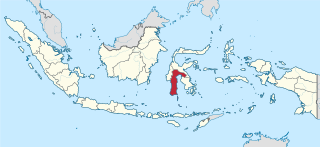
South Sulawesi is a province in the southern peninsula of Sulawesi. The Selayar Islands archipelago to the south of Sulawesi is also part of the province. The capital is Makassar. The province is bordered by Central Sulawesi and West Sulawesi to the north, the Gulf of Bone and Southeast Sulawesi to the east, Makassar Strait to the west, and Flores Sea to the south.
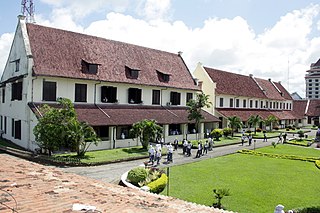
Makassar is the capital of the Indonesian province of South Sulawesi. It is the largest city in the region of Eastern Indonesia and the country's fifth-largest urban center after Jakarta, Surabaya, Medan, and Bandung. The city is located on the southwest coast of the island of Sulawesi, facing the Makassar Strait.
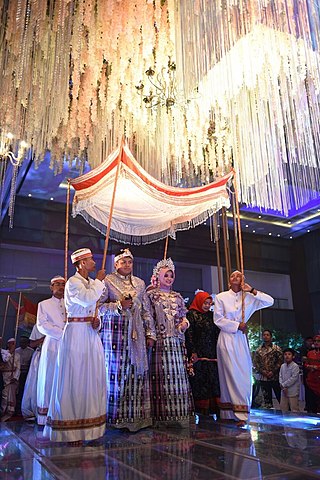
The Bugis people, also known as Buginese, are an ethnicity—the most numerous of the three major linguistic and ethnic groups of South Sulawesi, in the south-western province of Sulawesi, third-largest island of Indonesia. The Bugis in 1605 converted to Islam from Animism. The main religion embraced by the Bugis is Islam, with a small minority adhering to Christianity or a pre-Islamic indigenous belief called Tolotang.
In addition to its classical and literary form, Malay had various regional dialects established after the rise of the Srivijaya empire in Sumatra, Indonesia. Also, Malay spread through interethnic contact and trade across the Malay Archipelago as far as the Philippines. That contact resulted in a lingua franca that was called Bazaar Malay or low Malay and in Malay Melayu Pasar. It is generally believed that Bazaar Malay was a pidgin, influenced by contact among Malay, Hokkien, Portuguese, and Dutch traders.
The Lontara script, also known as the Bugis script, Bugis-Makassar script, or Urupu Sulapa’ Eppa’ "four-cornered letters", is one of Indonesia's traditional scripts developed in the South Sulawesi region. The script is primarily used to write the Buginese language, followed by Makassarese and Mandar. Closely related variants of Lontara are also used to write several languages outside of Sulawesi such as Bima, Ende, and Sumbawa. The script was actively used by several South Sulawesi societies for day-to-day and literary texts from at least mid-15th Century CE until the mid-20th Century CE, before its function was gradually supplanted by the Latin alphabet. Today the script is taught in South Sulawesi Province as part of the local curriculum, but with very limited usage in everyday life.
This is a list of some of the regions of Indonesia. Many regions are defined in law or regulations by the central government. At different times of Indonesia's history, the nation has been designated as having regions that do not necessarily correlate to the current administrative or physical geography of the territory of the nation.

Literally, the word pinisi refers to a type of rigging of Indonesian sailing vessels. A pinisi carries seven to eight sails on two masts, arranged like a gaff-ketch with what is called 'standing gaffs' — i.e., unlike most Western ships using such a rig, the two main sails are not opened by raising the spars they are attached to, but the sails are 'pulled out' like curtains along the gaffs which are fixed at around the centre of the masts.

The term lambo or lamba refer to two types of traditional boats from Indonesia.
Trans Studio is the world's third-largest indoor theme park, located in Makassar, South Sulawesi, Indonesia. The 20,000-square-metre (220,000 sq ft), 20-metre (66 ft) high building houses the indoor theme park. Trans Studio is built on 12.7 ha with investment up to IDR 1 trillion. The indoor theme park was inaugurated by the Vice President of Indonesia, Jusuf Kalla, exactly on September 9, 2009 (09-09-09). Trans Studio itself is a part of The Trans Studio World project, which will include Trans Walk and Rodeo Drive, Trans Studio, Trans hotels, and offices of Mega Bank. Under the management of PT. Trans Kalla, the Mega Development Project will provide an integrated development, comprising not only an indoor theme park, but also shopping mall, supermarket, hotel, office area, recreational beach area, and residential area. The whole project was scheduled to be completed sometime in 2010.
Robert Wolter Mongisidi was part of Indonesia's struggle for independence from the Dutch in South Sulawesi.
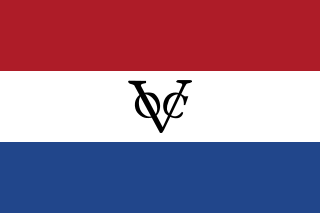
Dutch Celebes refers to the period of colonial governance on the island of Sulawesi - as a commandment of the Dutch East India Company from 1699 until its demise in the early 1800s, and then as a part of the Netherlands Indies or Dutch East Indies until 1945. Dutch presence in the region started with the capture of Sulawesi from the Portuguese, and ended with the establishment of the State of East Indonesia. Celebes is now referred to as Sulawesi. Makassar, the capital, was also referred to as: Macassar, Makassar, Macaçar, Mancaçar, or Goa, Gowa.
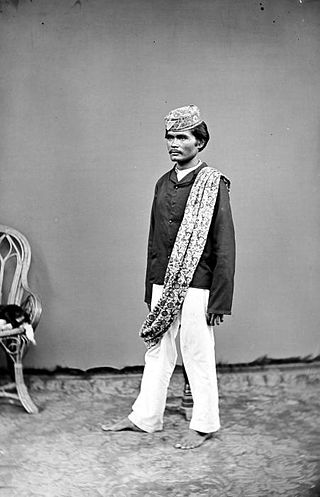
The Makassar or Makassarese people are an ethnic group that inhabits the southern part of the South Peninsula, Sulawesi in Indonesia. They live around Makassar, the capital city of the province of South Sulawesi, as well as the Konjo highlands, the coastal areas, and the Selayar and Spermonde islands. They speak Makassarese, which is closely related to Buginese and also a Malay creole called Makassar Malay.
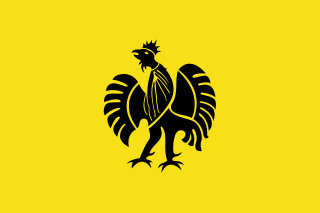
The Sultanate of Gowa was one of the great kingdoms in the history of Indonesia and the most successful kingdom in the South Sulawesi region. People of this kingdom come from the Makassar tribe who lived in the south end and the west coast of southern Sulawesi.
The Makassar kingdom of Gowa emerged around 1300 CE as one of many agrarian chiefdoms in the Indonesian peninsula of South Sulawesi. From the sixteenth century onward, Gowa and its coastal ally Talloq became the first powers to dominate most of the peninsula, following wide-ranging administrative and military reforms, including the creation of the first bureaucracy in South Sulawesi. The early history of the kingdom has been analyzed as an example of state formation.

Arung Palakka, or La Tenritatta to Unru' was a 17th-century Bugis prince and warrior. He supported the Dutch East India Company (VOC) in the Makassar War (1666–1669) against the Gowa Sultanate in his native South Sulawesi. After the defeat of Gowa, he became the King of Bone and South Sulawesi's most powerful man.
The Makassaric languages are a group of languages spoken in the southern part of South Sulawesi province, Indonesia, and make up one of the branches of the South Sulawesi subgroup in the Austronesian language family. The most prominent member of this group is Makassarese, with over two million speakers in the city of Makassar and neighboring areas.
The Makasar script, also known as Ukiri' Jangang-jangang or Old Makasar script, is a historical Indonesian Writing system that was used in South Sulawesi to write the Makassarese language between the 17th and 19th centuries until it was supplanted by the Lontara Bugis script.